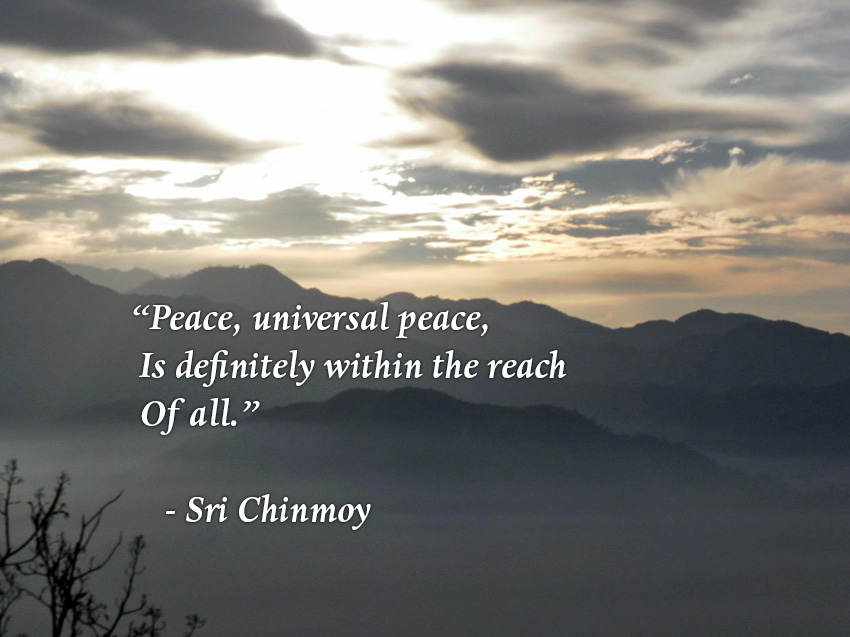
The modern world with its many fascinations, distractions and temptations can give us many things, but the humblest of all goals – our own inner peace – seems the one illusive thing beyond our reach. Yet, to attain inner peace it is not necessary to go back in time or visit the timeless Himalayan caves. Peace is perfectly compatible with modern life, if we learn how to harness the values of peace to the dynamism of modern life.
Peace In the Stress of Life
Often I hear people say ‘I don’t have time to develop peace’. They have a vague idea peace may be gained if only they could win the lottery and retire from work. It is a misconception that inner peace needs to be associated with an inactive life. We can often find inner peace through a purposeful life, a life of serving others. If we wallow in our own lethargy, we will never cultivate inner peace. Inner peace we don’t get from watching TV, at best it may give us a slight sense of relaxation, but not an abiding sense of satisfaction. Inner peace comes from a feeling of living a purposeful life. If we are unhappy, we will not gain peace.
Doing Our Best.
We put ourselves under great pressure. We want to try and keep everyone happy. But, inevitably it is impossible to keep everyone happy and always succeed in doing well. We have to judge ourselves on our motives and intentions – not the external outcome or what other people think. If we work with the right attitude, doing the best in difficult circumstances – what else can we do? Don’t allow the unreasonable expectations of others to disturb your inner peace. If we can work with this sense of detachment then we will avoid many feelings of guilty, worry and anxiety. It is these forces that disturb own inner peace.
Inner peace can never be dependent upon outer success and outer praise. It is the nature of the world to give success / failure, praise / blame in equal measure. We have to transcend this at be at peace with ourselves whatever happens.
One of the great spiritual texts – The Bhagavad Gita, was given in the middle of a war (Battle of Kurushetra). Sri Krishna advised Arjuna:
Do your duty to the best of your ability, O Arjuna,
With your mind attached to the Lord,
Abandoning (worry and) attachment to the results,
And remaining calm in both success and failure.
The Bhagavad Gita, Chapter 2.
Simplify.
It is true we don’t need to live in austerity or a Himalayan cave to cultivate inner peace. But, it is equally true, that we can easily minimise the pressures and inconsequential distractions that are readily available in modern life. Modern technology has given us unprecedented access to technology and communication. Undoutedely this has benefits if used wisely. But, sometimes it is like getting a glass of water standing under the Niagra falls. In other words we can become overwhelmed with information and this can become almost addictive. Similarly we can spend hours sending short messages or doing small things. We become reluctant to switch off from the electronic world and spend time enjoying the simpler pressures of life.
There are many ways to simplify our life (see: 10 ways to simplify your life) . – Getting rid of junk, spending less time on checking email, taking time to ourselves; but this simplicity is often feared in modern society because we have become so used to absorbing out attention in external distractions. We need to disentangle from some of these to be able to cultivate peace.
Thoughts.
To gain inner peace, we must learn to control our thoughts. It is our own thoughts which can take us to heaven or hell – no matter where we are on earth. We have to reject thoughts of jealousy, pride and insecurity. If we, even subconsciously, cherish these emotions then peace will be a far cry. It is when we cultivate good / uplifting thoughts that we can avoid the mental disturbance that is so harmful to inner peace.(How to control thoughts)
Another issues which is always very important is the idea that we have to want inner peace – it is only when we truly value the life of peace that we will work to make it happen. If we don’t value inner peace – how can we expect to have a peaceful life?
Real Peace
If we avoid negative thoughts and negative emotions; if we simplify our life and take a compassionate attitude to ourselves and others, we will definitely have a more peaceful life. But, to experience a very deep and abiding sense of peace, we need to go beyond the thought world and awaken the silence within.
“To come back to the secret of inner peace, our questioning and doubting mind is always wanting in peace. Our loving and dedicated heart is always flooded with inner peace. If our mind has all the questions, then our heart has all the answers.
– Sri Chinmoy
It is this quiet part of ourselves, that is the real secret of inner peace. We cannot experience this silent peace, through philosophy or talking. It can only be brought to the fore by a silent mind and open heart. In concentration and meditation, we learn to silence the endless stream of thought and awaken this peaceful consciousness.
We might gain a glimpse of this kind of peace when we are lost in the marvels of nature or listening to the most profound music. But, to gain an easy access to the real inner peace, meditation is by far the most effective strategy.
Introduction to meditation
It is all in the Mind.
There was a great sage who spent many years meditating in a cave. Over the years he developed tremendous inner peace through his meditation. Once a great King came to visit and spoke to the sage about the turmoils of his earthly kingdom. The sage asked the King why not come and meditate with me in the cave – Then you can have peace. The king replied – what would the use be? If I came here, I would still be thinking of my Kingdom – I would be building imaginary castles in the sky. The King, at least, realised the route to peace lay in his mind and no where else.
There is another story about the great King Janaka who lived in ancient India. He ruled over a large Kingdom but was detached from his own world wealth and power. Once he was sitting with his Guru and several followers. When news came of severe weather, everyone rushed back to look after their possessions. But, King Janaka who had by far the most possessions remained unmoved. He was untouched by worry over his material possessions. He preferred to sit at the feet of his Guru. We may only have a few dollars in our pocket, but, if we spend all our time worrying about our material possessions we will not have inner peace.
Photo by Tejvan






